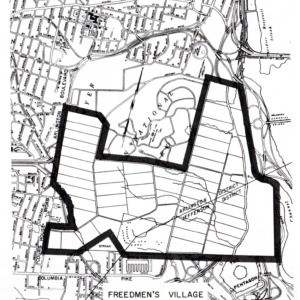
Freedman’s Village overlap on modern map, Sketch of Freedman’s Village in Harper’s magazine, 1864
On this day in Arlington history: December 4, 1863. Freedman’s Village is dedicated.
At the outset of the Civil War, fugitive slaves fled from nearby states to DC and the protection of the Federal government. By an Act of Congress in 1861, enslavers in the states in rebellion against the US could no longer recover their “property” referred to as contraband. In 1862 President Lincoln emancipated all slaves in the District of Columbia.
The large numbers of impoverished formerly enslaved people created a problem. A camp was established to house them on East Capitol Street—now the site of Folger Library. A smallpox epidemic forced the closure of the camp and it was moved to 12th Street. Conditions were still deplorable so in May 1863, the Quartermaster of the Washington Military District recommended that they be resettled in the “pure country air” of the Arlington estate. This village was located on what is now the southern-most point of Arlington National Cemetery. It was formally opened on December 4, 1863.
The village consisted of about 100 neatly whitewashed frame houses and rent was $3/month. Wells were dug for water and workshops to train residents with new skills such blacksmithing and carpentry. A “home” was established for those too ill or old to work where they were taken care of. Freedman who could worked earned $10/month and supplied with clothes, food, and lodging. This settlement played an important role in Arlington history and brought to the county the forebears of much of today’s African-American community. (Excerpted from Arlington County, Virginia: A History by C.B. Rose)


